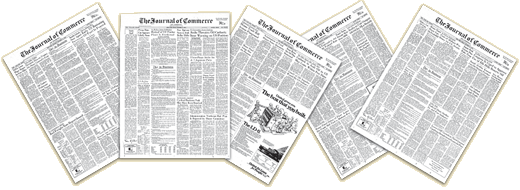They read it here first
| How the JoC broke the news of the 1973 Arab oil embargo |
It was perhaps the greatest scoop in The Journal of Commerce’s 175-year history. On Saturday, Oct. 20, 1973, as the Yom Kippur war raged, the world learned that Arab nations would be suspending the supply of oil to the United States. The Journal of Commerce had the story of the notorious Arab oil embargo more than a week earlier.
“It was a story that impacted the entire world,” said Harold Gold, who was editor of the JoC at the time.
Few thought the Arab nations would use oil as a weapon against the U.S. in response to its military support for Israel, which included a $2.2 billion militaryaid package. There had been threats, and an attempted embargo in 1967 that failed, so most dismissed the idea that it would ever happen.
“The prospect of an embargo didn’t even enter my mind,” a senior Aramco executive was quoted as saying in “The Prize,” Daniel Yergin’s history of the oil industry.

But the JoC, which had reporters on the petroleum, oil tanker and international trade beats, knew something was up — and was willing to stake its reputation on it. The newspaper’s lead page-one story on Oct. 12 carried the headline, “Arabs Threaten Oil Cutback; Issue Warning on U.S. Position.” On Oct. 15, the lead story was headlined “Cutback in Arab Oil to US May Come Within Few Days.” By the time the embargo happened, everyone knew the JoC had scooped the world.
How did the JoC land the story? There was nothing magic about it. Reporters were alert, they had nurtured sources they could rely on, and those sources came through in the clutch.
Petroleum reporter Martin Barolsky, now chief copy editor for American Banker, is given most of the credit. The first inkling he had was learning through a colleague on the shipping desk that there were problems loading oil in Saudi Arabia. The oil-tanker charter market was plummeting from rumors of an embargo, but there was no hard evidence.
“There I was turning out my daily oil copy, and the guy sitting behind said, ‘I got a guy on the horn here who says they won’t let him load up in Ros Tanura.’ I called someone in D.C. who essentially confirmed it.”
Barolsky said he needed further confirmation. That was provided by Peter Leach, a trade reporter who later became the JoC’s editor. Leach called Kerryn King, the senior vice president in charge of external affairs at Texaco. Leach’s wife worked with King’s wife at the Metropolitan Opera, and the couples had socialized.
“He returned my call promptly, and he gave me chapter and verse of what the Arabs had told the U.S. government,” Leach recalled.
Gold rates it as the biggest news story the JoC has broken in its 175-year history. “There were others that impacted individual industries,” he said, “but because of the great magnitude of this story, it was the most important scoop we ever had.” |

